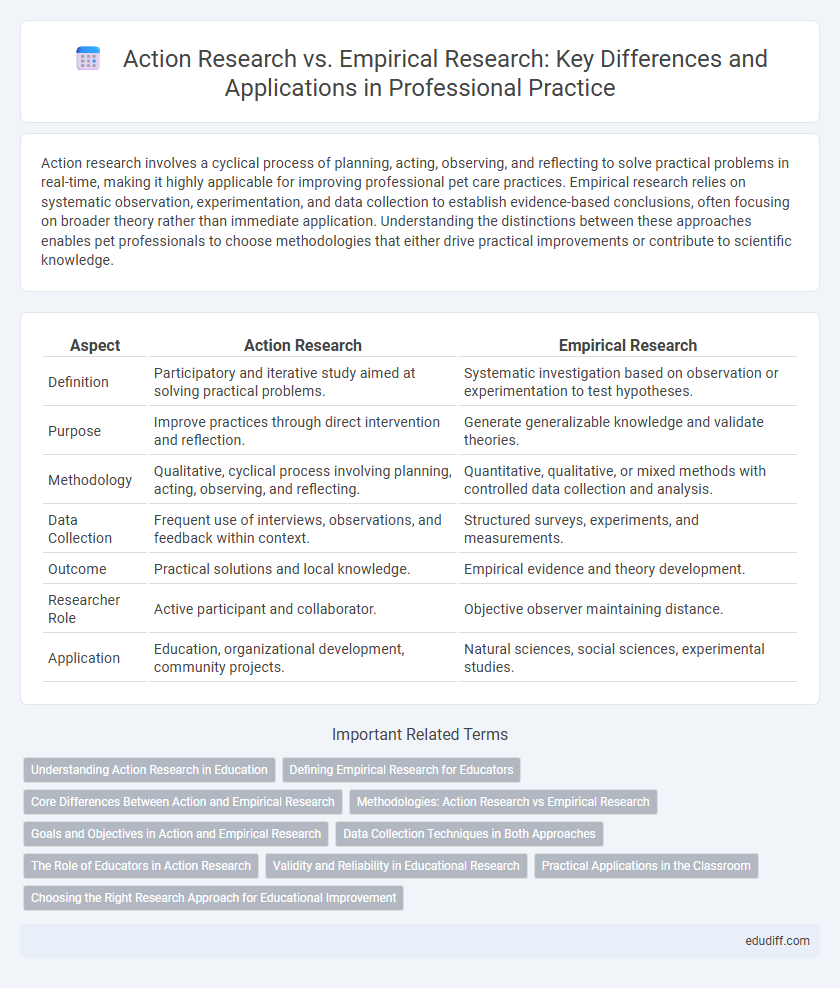Action research involves a cyclical process of planning, acting, observing, and reflecting to solve practical problems in real-time, making it highly applicable for improving professional pet care practices. Empirical research relies on systematic observation, experimentation, and data collection to establish evidence-based conclusions, often focusing on broader theory rather than immediate application. Understanding the distinctions between these approaches enables pet professionals to choose methodologies that either drive practical improvements or contribute to scientific knowledge.
Table of Comparison
| Aspect | Action Research | Empirical Research |
|---|---|---|
| Definition | Participatory and iterative study aimed at solving practical problems. | Systematic investigation based on observation or experimentation to test hypotheses. |
| Purpose | Improve practices through direct intervention and reflection. | Generate generalizable knowledge and validate theories. |
| Methodology | Qualitative, cyclical process involving planning, acting, observing, and reflecting. | Quantitative, qualitative, or mixed methods with controlled data collection and analysis. |
| Data Collection | Frequent use of interviews, observations, and feedback within context. | Structured surveys, experiments, and measurements. |
| Outcome | Practical solutions and local knowledge. | Empirical evidence and theory development. |
| Researcher Role | Active participant and collaborator. | Objective observer maintaining distance. |
| Application | Education, organizational development, community projects. | Natural sciences, social sciences, experimental studies. |
Understanding Action Research in Education
Action Research in education involves iterative cycles of planning, acting, observing, and reflecting to directly address classroom challenges and improve teaching practices. It emphasizes collaboration between educators and students, fostering a participatory approach to generating practical knowledge within real-world learning environments. Unlike empirical research, which seeks to produce generalized findings through controlled experiments, action research prioritizes context-specific solutions and continuous improvement in educational settings.
Defining Empirical Research for Educators
Empirical research in education involves the systematic collection and analysis of observable data to investigate teaching methods, learning outcomes, and educational environments. It relies on direct or indirect observation and experimentation to generate evidence-based conclusions that inform instructional practices. This approach contrasts with action research by emphasizing generalizability and adherence to scientific protocols within educational settings.
Core Differences Between Action and Empirical Research
Action research centers on iterative problem-solving within real-world contexts, involving collaboration between researchers and participants to implement and evaluate practical interventions. Empirical research relies on systematic observation or experimentation to test hypotheses and generate generalizable knowledge, emphasizing objectivity and controlled conditions. The core difference lies in action research's focus on immediate change and participatory methods versus empirical research's pursuit of theoretical understanding through detached analysis.
Methodologies: Action Research vs Empirical Research
Action Research employs iterative cycles of planning, acting, observing, and reflecting to address specific problems within real-world contexts, emphasizing collaboration and practitioner involvement. Empirical Research relies on systematic data collection and analysis through experiments or observations to test hypotheses and generate generalized knowledge. While Action Research focuses on practical solutions and continuous improvement, Empirical Research prioritizes objectivity and replicability in methodological design.
Goals and Objectives in Action and Empirical Research
Action Research aims to solve practical problems through iterative cycles of planning, acting, observing, and reflecting, with the objective of improving specific practices within a real-world context. Empirical Research seeks to generate generalizable knowledge by systematically collecting and analyzing data to test hypotheses and establish evidence-based conclusions. The goal of Action Research is immediate application and change, while Empirical Research prioritizes theory validation and broader scientific understanding.
Data Collection Techniques in Both Approaches
Action research employs iterative data collection techniques such as participant observations, interviews, and reflective journals to actively engage stakeholders in the research process and foster continuous improvement. Empirical research relies heavily on systematic data collection methods including controlled experiments, surveys, and quantitative measurements to generate objective and replicable findings. Both approaches prioritize rigorous data collection but differ in their level of researcher involvement and the flexibility of data gathering protocols.
The Role of Educators in Action Research
Educators in action research actively engage in iterative cycles of planning, acting, observing, and reflecting to improve teaching practices and student outcomes within their specific classrooms. Unlike empirical research, which often relies on external observation and data collection, action research positions educators as both researchers and practitioners, fostering practical solutions rooted in real-world educational contexts. This participatory role empowers educators to adapt interventions dynamically, promoting continuous professional development and localized innovation.
Validity and Reliability in Educational Research
Action research in education emphasizes iterative cycles of planning, acting, observing, and reflecting to improve teaching practices, which enhances ecological validity by grounding findings in real classroom contexts. Empirical research prioritizes systematic data collection and statistical analysis to establish generalizable results, often emphasizing reliability through standardized measures and replication. Balancing validity and reliability requires integrating action research's contextual insights with empirical research's methodological rigor to produce robust and applicable educational outcomes.
Practical Applications in the Classroom
Action research emphasizes iterative cycles of planning, acting, observing, and reflecting to directly improve classroom practices through teacher-led interventions. Empirical research relies on systematic data collection and analysis to establish generalizable findings that inform evidence-based instructional strategies. Both methodologies contribute to educational improvement, with action research providing immediate, context-specific solutions and empirical research offering broader theoretical insights.
Choosing the Right Research Approach for Educational Improvement
Selecting the appropriate research approach is crucial for educational improvement, with action research emphasizing iterative problem-solving and direct application within classroom settings, while empirical research relies on systematic data collection and statistical analysis to test hypotheses and generalize findings. Action research fosters collaboration between educators and stakeholders, promoting immediate pedagogical changes based on reflective cycles. In contrast, empirical research provides robust evidence through controlled experiments or observational studies, supporting broader educational policy development and theory validation.
Action Research vs Empirical Research Infographic

 edudiff.com
edudiff.com